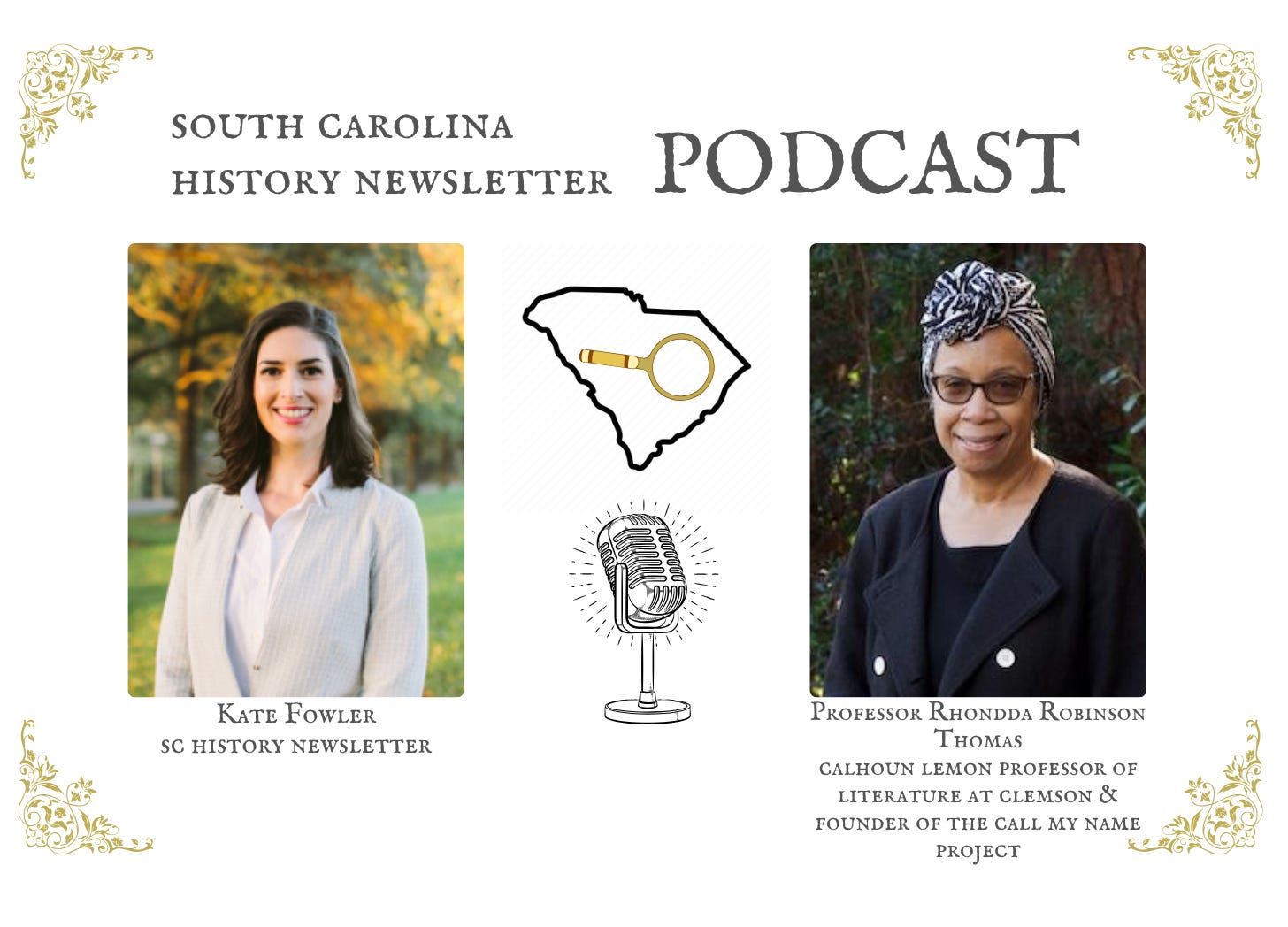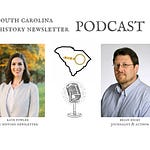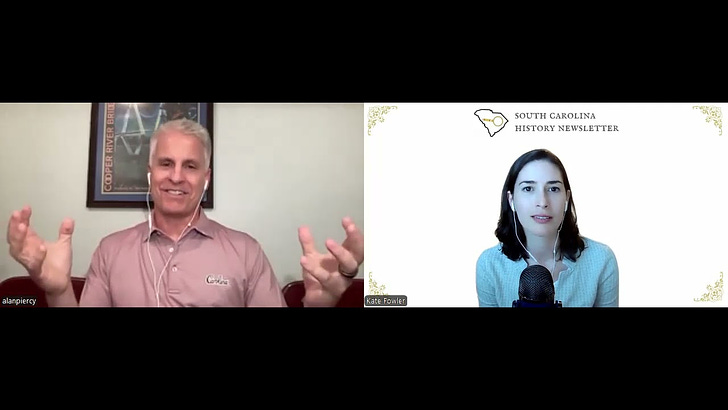In our Podcast #6, I was so excited to interview Professor Rhondda Robinson Thomas, who is the Calhoun Lemon Professor of Literature at Clemson University, where she teaches, researches, and writes about early African American literature in the Department of English. In this interview, we discuss her work as the founder of Call My Name – a crucial and inspiring project that seeks to research and document the stories, acknowledge the contributions, and honor the legacy of 7 generations of people of African descent in Clemson University’s history.
How to watch or listen to this interview:
Read the transcript of the interview:
If you would like to READ the interview, you can toggle to the transcript of the episode above at the top of this page (see image below to help):
Listen on the Substack:
Listen to the interview above with the above Substack podcast player!
Listen on iTunes:
Listen on iTunes by clicking here & subscribing:
Watch/listen on YouTube:
And here are time stamped highlights of our interview, including 3 reader questions:
4:55 - Professor Thomas discusses how when she first arrived at Clemson in 2007, slavery was not taught in the tours of John C. Calhoun’s Fort Hill Plantation House. Clemson is built on the plantation’s land. At the height of the plantation, there were 100 enslaved people working on the land.
7:11 - Professor Thomas outlines what the “Call My Name” project is and how it seeks to recover and share stories of the African American experience at Clemson from the very beginning when the land was still a plantation — to today.
10:06 - Professor Thomas describes what obstacles she has faced in her research for the Call My Name project
11:58 - Professor Thomas describes what has encouraged her and surprised her in her research for the Call My Name project
14:06 - READER QUESTION from David M.: "Did the University as an entity enslave people? Since there is now a list of names and possible connections to today’s descendants, is there an effort to offer “scholarships” to any of these individuals. Also is there any documentation on the lives [of the enslaved people] on campus - housing churches etc."
14:37 - Professor Thomas discusses the history of slavery at the Fort Hill plantation — and tells us about specific enslaved people whose stories she and her team have uncovered
21:27 - READER QUESTION from Randy B.: "Hello Professor Thomas! Do you have any records of slaves who served in the Confederate Army from Clemson University? Thanks!"
21:56 - Professor Thomas discusses the practice of men taking their slaves as their personal cooks into war
22:54 - READER QUESTION from Gabriel N.: "How easy (or hard) is it for someone who has grown up in this area - and as far as they know, parents were also born and raised in this area, to try to trace their lineage to their slave ancestors and really, in her experience, what is the curiosity level of local people to find out?"
23:14 - Professor Thomas discusses her research into the genealogy of the enslaved people who worked at Fort Hill plantation and outreach to these families today
27:48 - Professor Thomas discusses top 3 “eureka” moments in her research, including learning about Issy, an enslaved girl, who tried to set fire to John C. Calhoun’s plantation home.
35:58 - Professor Thomas describes evidence of enslaved labor in buildings on the Clemson campus today
44:36 - Professor Thomas discusses how the Black experience has changed at Clemson over the years and the impact of the Call My Name project
49:00 - Professor Thomas discusses the play she is writing about the Call My Name project and the impressive team who is helping her bring it to life
53:29 - Kate walks Professor Thomas through the “Carolina Questionnaire!”
55:55 - Professor Thomas shares that she believes South Carolina is “the epicenter of American History” and Kate agrees!
1:01:48 - Professor Thomas describes how people can get involved and support the work she is doing with the Call My Name project
1:03:35 - Farewells & good byes!
Here is Professor Thomas’s bio:
Rhondda Robinson Thomas is the Calhoun Lemon Professor of Literature at Clemson University where she teaches, researches, and writes about early African American literature in the Department of English. She has published Call My Name, Clemson: Documenting the Black Experience in an American University Community, which received honorable mention in the National Council on Public History’s 2021 book awards and co-edited The South Carolina Roots of African American Thought. Thomas is the faculty director of the award-winning Call My Name Project, for which she has received a fellowship, grants, and gifts through the Clemson University Foundation. She is writing a new play in collaboration with the Tectonic Theater Project, developing a NEH-funded traveling museum exhibit, and producing an eight-part video series based on research for Call My Name and co-directing the SC Upstate Black Heritage Trail project. In 2021, Thomas was Clemson University’s Researcher of the Year and recipient of the Class of '39 award, the highest honor given to Clemson faculty for service to the university, community, and/or nation. Currently, she serves as the Coordinator of Research and Community Engagement for Clemson University’s Cemetery Historic Preservation Project, chair of the Advisory Committee for Clemson's Memorial for Black Laborers project, and as a member on the South Carolina State Board of Review for the National Register of Historic Places.













Share this post